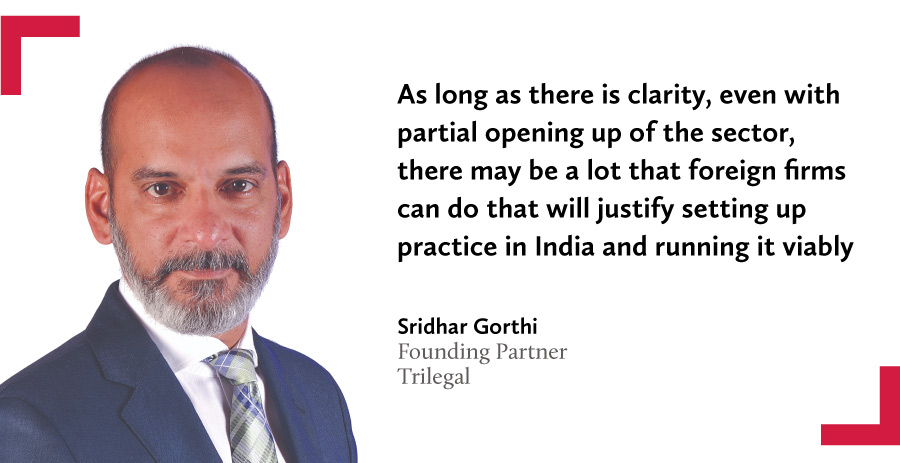India has opened its legal market, but regulatory uncertainties and domestic opposition give foreign law firms pause for thought. By Freny Patel
India’s Bar Council has at last agreed with repeated calls from the international legal community for the country to open its legal sector to foreign law firms but the fine print of the rules raises doubts about much-needed assurances of a phased approach to domestic players and lack the clarity sought by the global legal community.
India created history on 10 March when the country’s Bar Council finally gave its nod for the “gradual” opening of the legal sector to foreign law firms and foreign lawyers after more than a decade of objecting to the entry of foreign lawyers.
The issuance of the Bar Council of India Rules for Registration and Regulation of Foreign Lawyers and Foreign Law Firms in India, 2022, was clearly triggered by the UK-India free-trade agreement discussions and in the face of strong lobbying by the UK government and the Law Society of England and Wales.
Foreign lawyers and law firms can now practice foreign law, engage in international arbitration matters, and advise on international legal issues in non-litigious matters in India on the principle of reciprocity. While they can practice transactional and corporate work, such as joint ventures, M&A, intellectual property matters, and drafting of contracts, they will not be allowed to appear before any courts, tribunals, or other statutory or regulatory bodies in India.
However, within a fortnight of the Bar Council of India announcing the liberalisation of India’s legal market, several leading Indian lawyers – including Jyoti Sagar, chairman, and Amit Kapur, joint managing partner, of Jyoti Sagar Associates; along with Pallavi Shroff, managing partner at Shardul Amarchand Mangaldas; and V Lakshmikumaran, founder and managing partner, and L Badri Narayan, partner, at Lakshmikumaran & Sridharan – raised objections to the manner and timing of the opening up.
The opposition among Indian law firms concerns the manner in which the rules have been drafted and framed, without due consultation, and the lack of clarity about the scope of what’s permitted.
The concerns raised are primarily about first introducing domestic reforms to level the playing field, such as providing clarity on limited liability partnerships, and allowing business promotion and market development activities, Sridhar Gorthi, a founding partner at Trilegal, tells India Business Law Journal. “These simple reforms are a necessary precursor to the opening up of the sector to foreign law firms,” he explains.

You must be a
subscribersubscribersubscribersubscriber
to read this content, please
subscribesubscribesubscribesubscribe
today.
For group subscribers, please click here to access.
Interested in group subscription? Please contact us.
你需要登录去解锁本文内容。欢迎注册账号。如果想阅读月刊所有文章,欢迎成为我们的订阅会员成为我们的订阅会员。
Read the related article here:
India permits entry of foreign lawyers and law firms
The Bar Council of India (BCI) announced new rules on Wednesday signalling a significant policy shift that relaxes entry conditions allowing international lawyers and arbitration practitioners to advise in the country
For more related stories, visit law.asia.




























